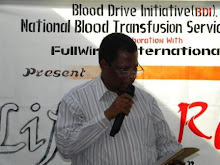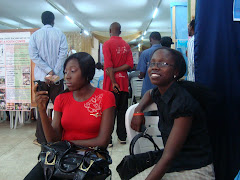| The World Health Assembly set aside June 14th of every year to celebrate and thank those who donate blood for altruistic reasons (voluntary unpaid blood donors). The June date was selected as it is the anniversary of the birth of Karl Landsteiner, the Nobel Prize winner who discovered the ABO blood group system in 1907, which has made blood transfusions a key part of modern medicine since 1930. The aim of designating a special day each year to celebrate the role of these blood donors in health care around the world is to motivate more individuals to become regular voluntary unpaid blood donors; create wider awareness of the vital role of blood transfusion in saving lives and improving the health of millions of people each year; to recognize regular voluntary unpaid donors as public health role models; and to promote a healthy life style among the populace to encourage them to donate blood regularly. The theme for this year World Blood Donor Day is, "More blood, More life." This theme reinforces the vital role of blood transfusion in saving lives and urgent need for more people all over the world to become lifesavers by volunteering to donate blood regularly. The need for safe and secured supplies of blood and blood products is universal. Worldwide, at least 90 million units of blood are donated each year to save lives and improve health. However, demand for blood for transfusion continues to increase, and many countries cannot meet the existing needs. In many regions, this means inadequate supplies to replace blood lost in childbirth (a major cause of maternal deaths) and to treat anaemia that threatens the lives of children who have malaria or are undernourished. Everywhere, blood and blood products are needed by a growing number of people: those injured in road traffic accidents, those with congenital blood disorders and for routine emergency surgery and life-saving treatment. Today, 62 countries have blood transfusion services based entirely on voluntary blood donation, compared to 39 in 2002 and 57 in 2007. Belarus, the Islamic Republic of Iran, Malaysia, Kenya (Africa) and Zambia (Africa) are the latest to join this list. Nigeria is yet to achieve this status. Other African countries that have achieved this before are South Africa, Zimbabwe and others. The need to achieve 100% voluntary blood donation is very crucial especially in our nation Nigeria as facts show that;
The aforementioned facts among others, shows why we need to campaign for Voluntary Non Remunerated Blood Donation (VNRBD) from low risk population of voluntary donors as recommended by the apex world health organization (WHO). Safe Blood Donors (i.e. VNRBD) therefore, are the cornerstone of a safe and adequate supply of blood and blood products, which will avert the trend of these facts. Overall, the benefits of a regular, voluntary blood donation are: Donor
Blood Service
matching supply and demand
inventory management
Patient
in the future. Community
Towards this BDI , a youth-based organization is in the front gear of canvassing for 100% voluntary non remunerative blood donation in Nigeria and is currently operating from University and community based detachment such as AAU, LAUTECH (Oshogbo and Ogbomosho), UNIILORIN, EBSU ,UI,UNAAB, UNICAL ,UNIILAG , FEDPOLY EDE. 08033949820 REFERENCES http://wbdd.org/fileadmin/Fil_Arkiv/PDF-diverse/WBDD-booklet.pdf http://wbdd.org/fileadmin/2011/WBDD_2011_English.pdf |
Caption
Life makes sense when there is someone to share it with
Blood donation in swing

LIFE 'N' RED

Popular Posts
-
THE PSYCHOLOGY OF BLOOD DONATION Psychology which is the study of the mind is derived from Psyche “breath, spirit and soul” and logia, - ‘s...
-
BLOOD DRIVE INITIATIVE QUESTIONNAIRE ON BLOOD DONATION Dear respondent, Blood drive initiative is a non-governmental organization whose aim ...
-
The landmark discovery of the ABO blood group system by Karl Landsteiner in 1900 paved way for easy transfusion of blood and blood products ...
-
RAJI SHAKIRUDEEN ADESHINA ADEPOJU OLUWASEUN ADEWOLE FAGHILE PIUS SALAMI FAVOUR OPEYEMI JAYEOBA E.B OYELAMI OLUFEMI OYENIRAN S. TEMITOPE ALLI...
-
AVAILABILITY OF SAFE BLOOD TOWARDS AN HIV-FREE SOCIETY: A CALL TO ACTION Annually, World AIDS Day (WAD) provides an opportunity for all of...
-
The joint BOD/BOT meeting of the foremost youth-led donor organization in Nigeria is underway in a couple of days. This is an all important ...
-
Tomorrow is the d-day. Hope to see you all at Ibadan (BDI's national headquarter), venue of the Intellectual discourse to commemorate WB...
-
The workshop was held on sat. 25th sept. 2010, titled Basic blood sefety core knowledge. It had in attendance 26 participants. This worksh...
-
Blood Drive Iniative was recently invited by NBTS Kogi sate centre to come and help with the establishment of BDI detachments in institution...
THE NEED TO SAVE A LIFE
Prof. A.H Fagbami, Chairman BDI Board of Trustees at the Exhibition Opening

Prof. A.H Fagbami, Chairman BDI Board of Trustees at the Exhibition Opening
REV. DELE SOTONWA DONATING BLOOD

Saving lives is the job of all

Donate to support BDI on Global Giving; Give 2500Nigerians a chance at life via Safeblood
Donors' party
Ibadan Exhibition

NBTS HQ

Stand

Total Pageviews
Opening

BDI workshop in session

